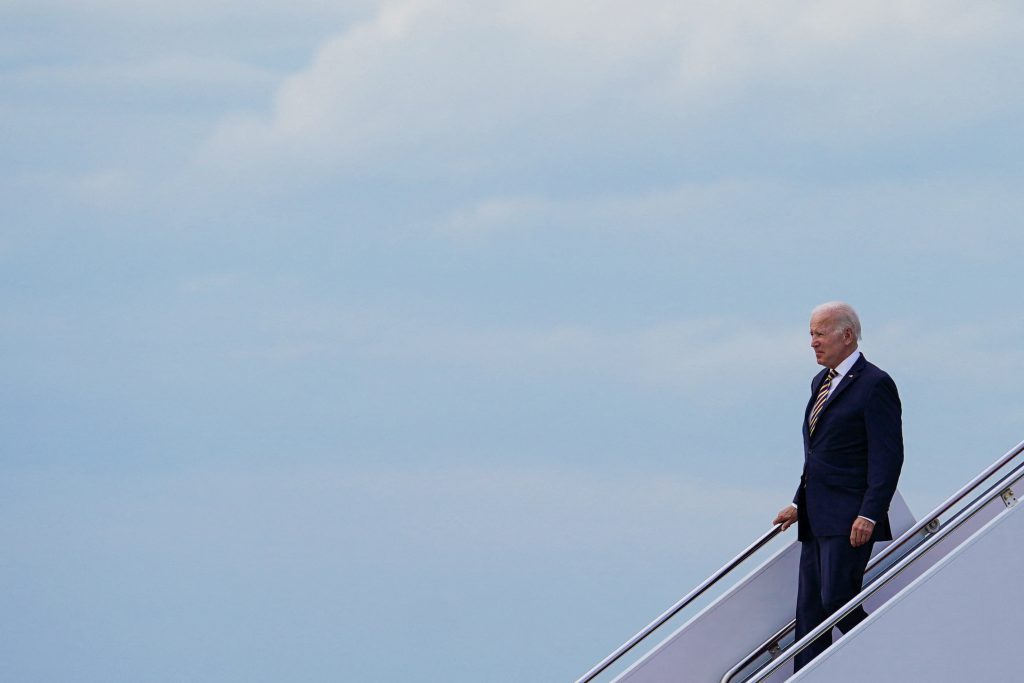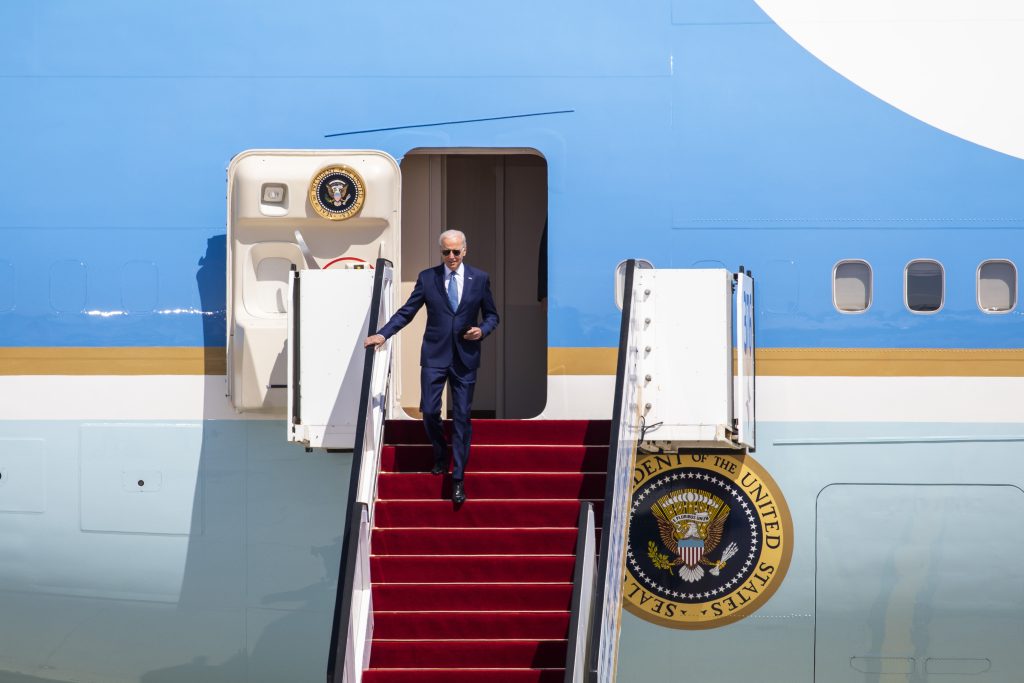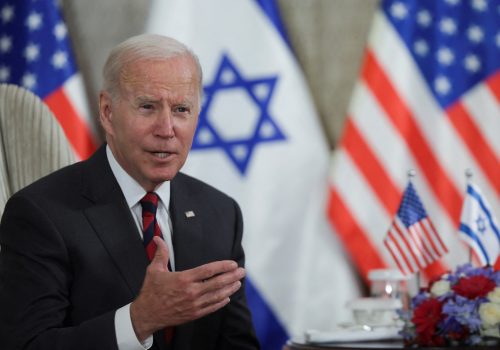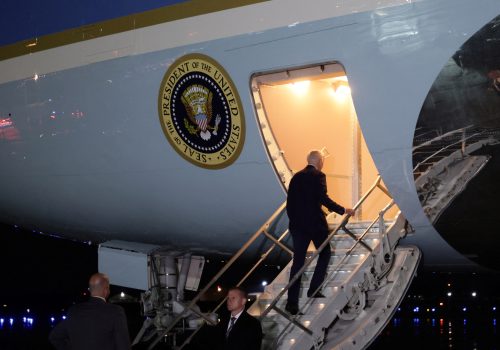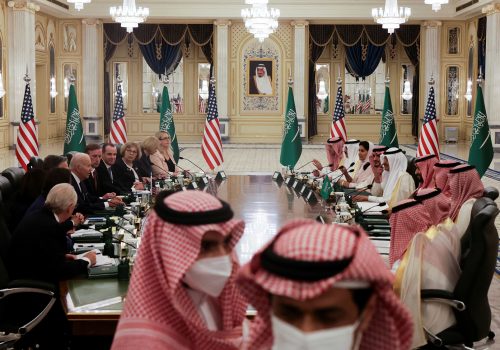On July 21st, the N7 Initiative, in collaboration with the Scowcroft Middle East Security Initiative, hosted a virtual event titled “Biden’s trip to the Middle East: Outcomes and opportunities.” This event was a part of the N7 program dedicated to advancing normalization, peace, and stability in the region and featured Ambassador Daniel Shapiro, former US Ambassador to Israel and Distinguished Fellow with the N7 Initiative; Jonathan Panikoff, director of the Atlantic Council Scowcroft Middle East Security Initiative; and Kirsten Fontenrose, a nonresident senior fellow at the Atlantic Council. Moderated by Katie Bo Lillis, a reporter at CNN, the event featured commentary and analysis of the security, economic, and political dynamics at play in the wake of President Biden’s visit to Israel, the Palestinian Authority, and Saudi Arabia.
Tensions in the US-Saudi relationship and the path forward
The murder of Jamal Khashoggi in 2018 marked a turning point in US-Saudi relations, and the Biden administration publicly announced its intention to make Saudi Arabia a global “pariah” over the murder of The Washington Post journalist. Jonathan Panikoff argued that Biden’s trip represented a reset in the US-Saudi relationship, and the prospect of continued pressure on Saudi Arabia over the murder of Khashoggi and their human rights issues in Yemen may inhibit partnerships that could counter the growing influence of China and Russia in the region. Ambassador Daniel Shapiro and Panikoff concluded that if the US continues to further expand its relationship with Saudi Arabia in areas of technology and security, there is a possibility that the United States can turn the page on previous actions of the Saudi government while enforcing human rights standards in the future. Furthermore, a US-facilitated normalization process between Saudi Arabia and Israel becomes more likely as the two states develop economic ties that can transition into diplomatic and security partnerships, countering the growing influence of Iran, Russia, and China in the region.
In contrast, Kirsten Fontenrose argued that the US-Saudi relationship has remained fundamentally unchanged, contending that relations between the US and Saudi Arabia have remained transactional. For example, prior to Biden’s visit to Jeddah, Saudi officials averred that they had the capacity to pump more oil to offset rising gas prices, a position they promptly retracted upon his arrival. Fontenrose, Panikoff, and Shapiro agreed that the lowering of oil prices upon Biden’s visit to Saudi Arabia was incredibly unlikely, but the action underscores a tumultuous relationship between the two nations that can serve to benefit both President Biden and Crown Prince Mohammed bin Salman in their respective domestic policy theatres.
Challenges to the US-Israeli alliance
In Biden’s opening remarks in Israel, he made clear the United States’ enduring commitment to a two-state solution but indicated that Palestinian statehood is not possible in the near future. With a variety of factors, ranging from the impending Israeli election and the potential power vacuum in the Palestine Authority, Shapiro and Panikoff agreed that a traditional bilateral negotiation process for a two-state solution is not likely to occur soon. Shapiro asserted that pushing the Palestinian Authority and the Israeli government to the negotiation table absent ripe conditions amid domestic political turmoil would lead to the failure of the two-state solution. However, Panikoff commended Biden’s decision to meet President Abbas, arguing it communicates a symbolic message that the US will continue to engage with the Palestinian territories.
Furthermore, Panikoff and Shapiro agreed that Lapid’s centrist government will acknowledge and engage with the US differently than Netanyahu’s Likud-led coalition. While the US would prefer dealing with a Lapid government to a right-winged Netanyahu coalition, there are still issues where the two governments differ, particularly on how to address tensions with Iran. If the JCPOA negotiations fail, a prevention strategy will need to be employed in order to prevent an Iranian nuclear threshold state. A concerted push for Iranian nuclear prevention will require extensive coordination among allies and will test whether the current US-Israel relationship will allow them to hold these conversations.
The future of US-Gulf security engagement with rising power competition
While there has been a perception of US withdrawal from the MENA region, Panikoff underscored the United States’ continued physical and diplomatic presence but relented that threats like the war in Ukraine and disputes in the South China Sea can divide US attention. Changes in US-MENA relations can further create vacuums that Russia and China look to fill. While there are contexts where Gulf states must make hardline decisions between the US and China, Panikoff and Shapiro agreed it is very unlikely that MENA states will abandon all relations with China and solely deal with the US.
Fontenrose highlighted the discussions and framework agreements over cyber, 5G, and space explorations as moves to counter Chinese influence in the region without drawing lines between the US and China. She further discussed the shortcomings of US foreign policy perception within the MENA region as hasty responses without strategies for a specific state and regional vision. Fontenrose argued that if the US were to share a strategic plan that integrates the Gulf states into long-term goals, the Gulf governments would be more supportive of US action within the region and, therefore, less likely to seek input from China. As the United States overextends itself into the political theatres of the Middle East and the South China Sea, there is very little desire in the US government to have more security obligations. To account for this, unified Gulf nations need to share what they bring to the table for further security collaboration. Fontenrose referred to NATO as an example, where the unified force of several military powers serves as a strong security partnership. If the Gulf countries were to unify in a similar partnership, the United States could be incentivized to collaborate on security issues. Similarly, Panikoff emphasized the need for the US to offer more alternatives to Chinese partnerships, which could aid holistically with security issues at large.
Alexandra Kaiss and Mariah Smith are Young Global Professionals with the Middle East Programs at the Atlantic Council.
Further reading
Fri, Jul 15, 2022
Experts react: What’s next for the Middle East after Biden’s big visit?
MENASource By Daniel B. Shapiro, Barbara Slavin, Ariel Ezrahi, Thomas S. Warrick, Shalom Lipner, Carmiel Arbit, Nadereh Chamlou, Sina Azodi, Mark N. Katz, Andrew L. Peek
The trip focuses on repairing relationships across the region in an effort to foster regional stability and advance normalization with Israel. Atlantic Council experts react to the trip and what it means for the wider region.
Wed, Jul 13, 2022
Biden’s Middle East trip is sending Iran an escalatory message. Here’s why.
MENASource By Shahira Amin
The flurry of diplomatic activity in the region ahead of Biden’s Middle East trip, is part of efforts by the GCC and Arab leaders to coordinate stances and forge a unified force against Iran.
Tue, Jul 19, 2022
Why Biden’s Mideast trip was much ado about very little
New Atlanticist By Kirsten Fontenrose
Saudi Arabia’s definition of US commitment, as well as the Gulf’s more broadly, does not align with the amount of skin the United States is willing to put in the game.
Image: U.S. President Joe Biden descends from Air Force One following a trip to Ohio at Joint Base Andrews, Maryland, U.S., July 6, 2022. REUTERS/Sarah Silbiger
